Student Composers Project, Spring 2018
"There’s a certain Slant of light" by Lili Tobias '19
"Ice Seventeen" by Branch Freeman '20
For the first time ever, the Garnet Singers performance was entirely comprised of music by Swarthmore composers. “The Garnet Singers gamely embraced the daunting challenge of presenting a set comprising mostly premieres; the student composers, for their part, have worked hard to craft wonderful new works for the group, and in the process learned a great deal about writing for choirs.” -- Joe Gregorio. The 2018 spring choral concert represents more than just the product of these songs. It truly showcases the entire process from creation to performance–with Swarthmore students involved every step of the way.
"more" by Min Cheng '18
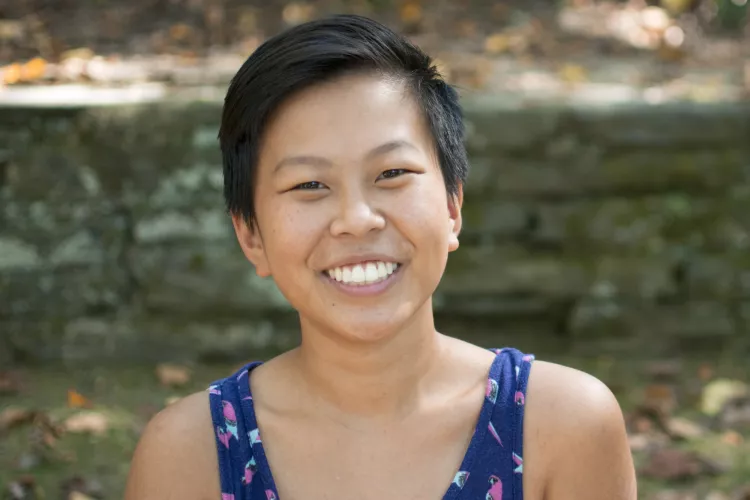
Min Cheng is a senior with a major in Economics and a special major in Sociology/Anthropology & Educational Studies. Min has been involved in music and choral singing from a very young age, but has only recently entered the world of arranging and composition. “more” is Min’s debut composition.
I approached Joe in the middle of the fall semester, telling him I wanted to compose something for Garnet Singers because I had been inspired by Rachel Hottle’s composition “We Grow Accustomed to the Dark.” I had been arranging R&B, jazz, and pop for my a cappella group Mixed Company for three years, so the idea of composition was not totally foreign, but I still had never taken a music theory course at Swarthmore or composed any choral piece in my life. I set off to find a text, and settled upon a poem called “more” by Maya Kikuchi, a sophomore and fellow member of Mixed Company and Chorus.
Often, artists struggle with finding legitimacy in their efforts. They think of themselves not as powerful shapers of creation, but as undeserving agents of the muses. I had the opposite problem. I had blithely and publicly committed to writing this piece and having the Garnet Singers sing it the next semester without any idea of how difficult it would actually be to sit down and think of something original with only the text as inspiration. Over winter break, I had to do just that. I used working on my composition as an excuse to productively procrastinate on writing the third chapter of my thesis, which was due the day break ended, and was able to invest a lot of time into starting and scrapping many drafts. The melody that ended up becoming the main motif came from me sitting on my bed, eyes closed, willing myself to come up with something. As uncreative as that sounds, such is often the process of artistic creation under deadline pressure.
The first 16 bars that I brought Joe were very much a rough draft, and many tweaks had to be made to make the draft even singable. I had forgotten that singers need to breathe every now and then, and there was more than one occasion that I had asked the singers to sing unreasonably high or low notes at unreasonably high or low volumes. There were dissonant intervals that would be more difficult to tune than they were worth, and seemingly atonal lines that just — they weren’t right. The music didn’t bring out the gorgeous nature imagery of the text, didn’t highlight the introverted reflection the speaker of the poem was performing, didn’t drive the listener to ask — what is more than all of these things? What is the unspoken referent of all of these lines? The piece, while written with the poem as its lyrics, was unconnected to Maya’s text. All that, plus it being impossible to learn, meant that I had to revisit what I had written and implement the changes in my composition process for what ended up being the next 46 bars.
Of course, I am not saying that the piece as it stands now does do all those things with the text that I said my first draft did not do. I think it got closer, but I think the point of this whole process — which I am very grateful to Joe for allowing me to participate in — was educational for me. While I am not a music major and will never go to music graduate school, the composition lessons I have learned from him and from the Garnet Singers and from my peer composers have been invaluable.
Firstly, sing through everything you write. Secondly, try to write in order to bring out something in the text that would not be highlighted via a non-musical reading out loud of the poem. Lastly, and this is most important, do not underestimate the power of the voice as an instrument. Words can lead us to expect certain things, and singers have the ability to do something unexpected to great effect. Rhymes can be subversively constructed. Certain vowels are darker or brighter, and words with lots of fricative consonants or aspirated t’s (like “spitted pits”) sound very different from mellow, soft words (like “tissue skin”). No other instrument can sing words. That is what I find most gratifying about composing for voice.
"Oh!" by Rachel Hottle '18
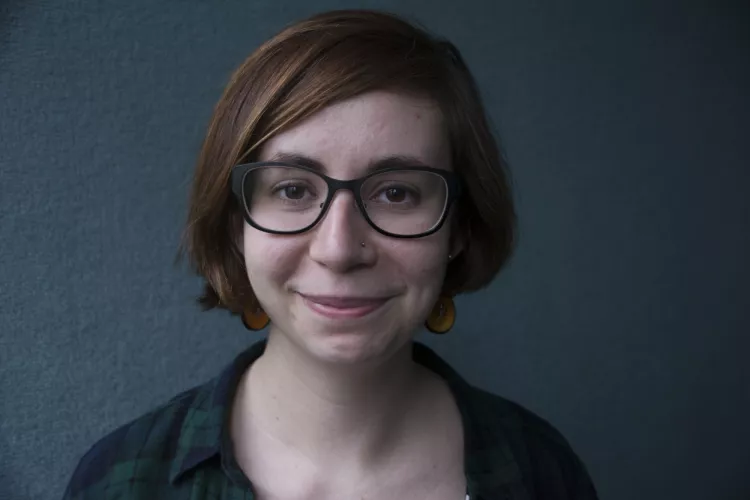
Rachel Hottle is a music major and biology minor from Gettysburg, PA. While she only began composing at Swarthmore, she has been making music her entire life. She has played the guitar for 9 years, the flute for 11 years, the piano for 15 years, and has sung since she could reliably control her vocalizations (around age 3?). She cannot go more than an hour without thinking about or listening to music, so tightly contained is she within the grasp of that devilish art form. In the fall of 2018, she will begin the pursuit of a Masters of Arts in Music Theory at McGill University in Montreal, with the goal of spending the rest of her life thinking about music.
I wrote the entirety of this piece on my living room couch over winter break of 2017-2018. The fall semester was very academically intense for me and I felt like I had not stretched the creative part of my brain in several months. I was glad for the opportunity to do nothing for several weeks but make art. A dear friend introduced me to God’s World several years ago, and in the depth of winter, Millay’s exuberant celebration of the natural world called out to me.
Oh! is the second piece I composed for Garnet Singers, and after my experience workshopping We Grow Accustomed to the Dark with the singers last semester, I had some ideas about compositional techniques I wanted to try out. I’m a big fan of writing lines for section duets or trios within the chorus, but I wanted to be more intentional in my use of the full chorus in this piece. The poem itself is strophic, and each verse opens with the buoyant proclamation, “O World!”, so I reserved the use of the full chorus for moments like this. After writing a piece for a cappella chorus last semester, I wanted to try my hand at composing piano accompaniment. In Oh!, I primarily use the piano to punctuate and comment on the chorus’ lines, or to reinforce melodic motifs introduced by the chorus. Joe and Josh were very helpful in providing advice on making the piano part as playable and cohesive as possible.
This piece springs from a place of sheer joy, and that’s unusual for me, and I think for most composers. I’m very used to writing from a place of angst, and to using music- making as an emotional release. Composing a work that comes from such a place of wide- eyed appreciation as Oh! does is a completely different and somehow more healthy experience. The cyclic nature of the natural world gives a different tone to the anguish of “let fall no burning leaf” – although the nakedness of winter fills me with despair, I know that it won’t last. It’s cheesy, but I’m filled with a very pure kind of hope every time we rehearse the piece, and I think that’s a sentiment that I would do well to carry over into other areas of my life. If only other person hears my composition and feels the same kind of hope, I will have done my job.
"Towers" by Asher Wolf '18
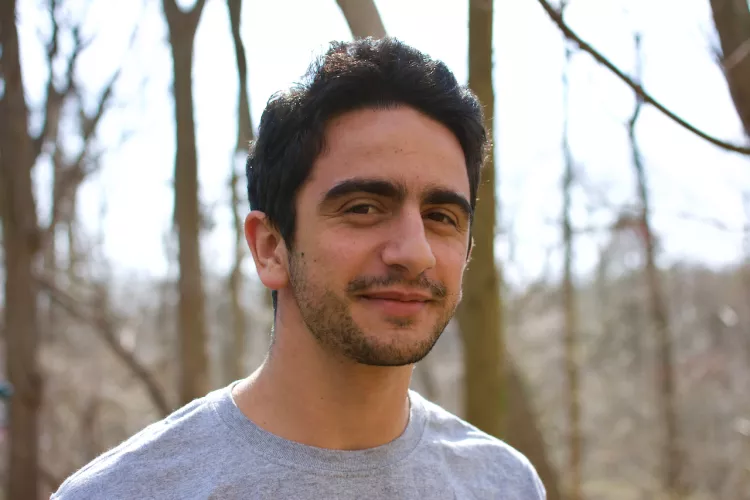
I approached Joe about writing a piece for Garnet Singers because I saw that Rachel got to and I was jealous (her piece was really cool). I was spoiled because I already got to compose for the Jasper Quartet, which had a residency last semester. That piece was wild - anguished, rarely tonal, often maximally dissonant, cruelly difficult - and I only got away with it because the musicians were game and more or less omnipotent. Thus began my foray into "new music." But meanwhile I had been writing songs; like more or less normal songs, loosely situated in the meta-genre of rock (read: alt, indie, folk, jazz, soul, etc.) I found myself with a split personality, and for "Towers" I sought a middle-ground between my two compositional identities.
The idea was that I would write an active texture for the chorus to support a lead singer and maybe stick to a relatively identifiable song form while screwing around liberally with harmonies and arrangement. I wrote a chord melody on piano that I thought would contrast nicely with this ominous octatonic section I had floating around from last year's composition class with Dad (Jerry Levinson). It was important to me that I avoid making good choral music. In other words, I didn't want the parts to be independent lines dancing around each other with elegant counterpoint. I am a foreigner to realm and methodology of western classical (I tend to make music by playing it myself), so my options were either to fail at approaching the medium/creative process by the books or to do something counterintuitive. At some point along the way it occurred to me that I needed to decide what shapes the singers ought to make with their mouths. I hit up my friend Mobin (born Moses Rubin), and we developed the text together as the piece came into being, forming the two components in dialogue. I was thrilled to have Shelby Billups as a lead singer, and I tried to compose as little as possible for her. I wanted to teach it to her the way I would teach any other song to a singer. Western musical notation is useful for unifying lots of different people and dictating pitch class, but can often stifle the more subtle and organic musical qualities of performance that might otherwise emerge. So we worked through the piece at a piano, and she either came up with melodies herself or else put a heavy spin on what I suggested.
"There’s a certain Slant of light" by Lili Tobias '19
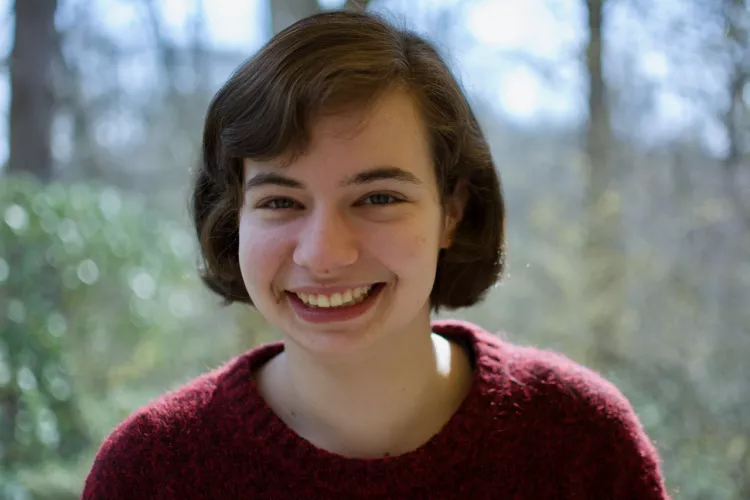
“There’s a certain Slant of light” was my first choral piece. I had actually written it way before Joe organized the music for this concert, and I had already had it performed by a vocal quartet (who all happened to be in Garnet Singers anyway, so they had a head start learning the music!). It’s been exciting seeing it take shape with a larger group. I had to make a couple changes to the music in order to facilitate the rehearsal process and improve the text-setting.
The inspiration for “There’s a certain Slant of light” came mainly from three sources: my good friend and fellow composer, Rachel Hottle; the Cartoon Network miniseries, “Over the Garden Wall;” and Johannes Brahms. When Garnet Singers sang Rachel’s first choral piece last semester, I was really impressed with her setting of an Emily Dickinson poem. After rehearsal one night, while humming Rachel’s piece to myself, I caught sight of the poster my roommate and I have on our wall of “There’s a certain Slant of light,” and I created my own melody for it. That quickly turned into the first and last stanzas of my piece. “Over the Garden Wall” inspired the entire aesthetic of the piece—one that’s nostalgic and slightly gloomy. And from Brahms, I took a quotation, because I like quoting things.
"There’s a certain Slant of light" spoken introduction
"There’s a certain Slant of light" recording
"Ice Seventeen" by Branch Freeman '20
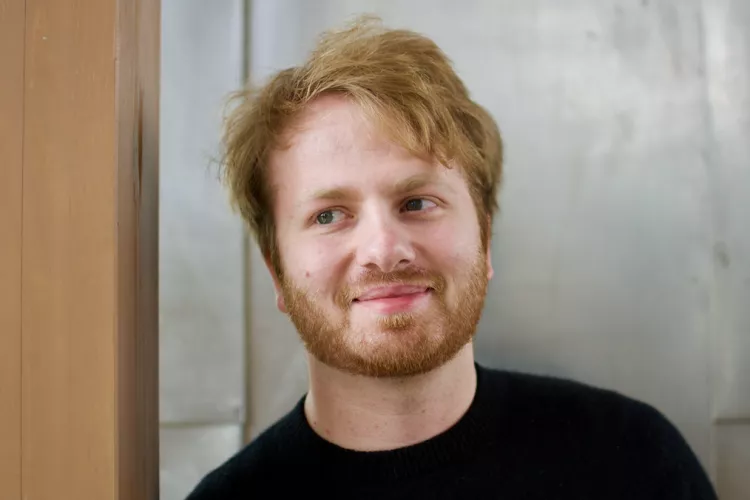
When I learned that I would have the opportunity to compose for the Garnet Singers, I looked first to the scientific world––particularly chemistry––for inspiration. I discovered that ice can exist in 17 different chemical arrangements, or phases, and that although these phases are similar, each has its own unique properties. I also found that the diagrams chemists have created to represent these phases are very beautiful. I initially conceived of the piece as a sort of "progression" through the phases of ice, using these diagrams as inspiration. As far as the music itself, I wanted to write something quiet and introverted, with a spiritual quality. I turned to the choral music of the late British composer John Tavener, whose sacred choral pieces I've always loved. I hope that the spiritual elements of his music come through in my piece.
"Ice Seventeen" spoken introduction
"Ice Seventeen" rehearsal recording



